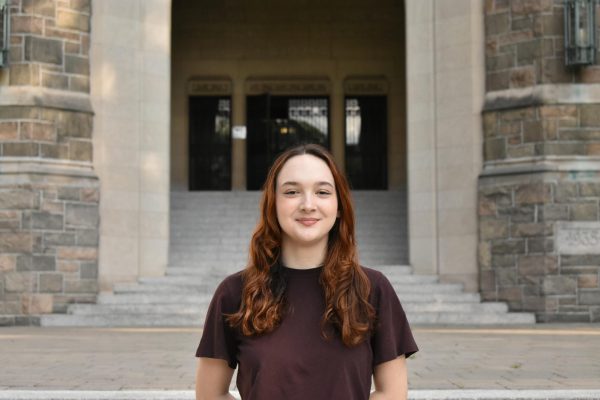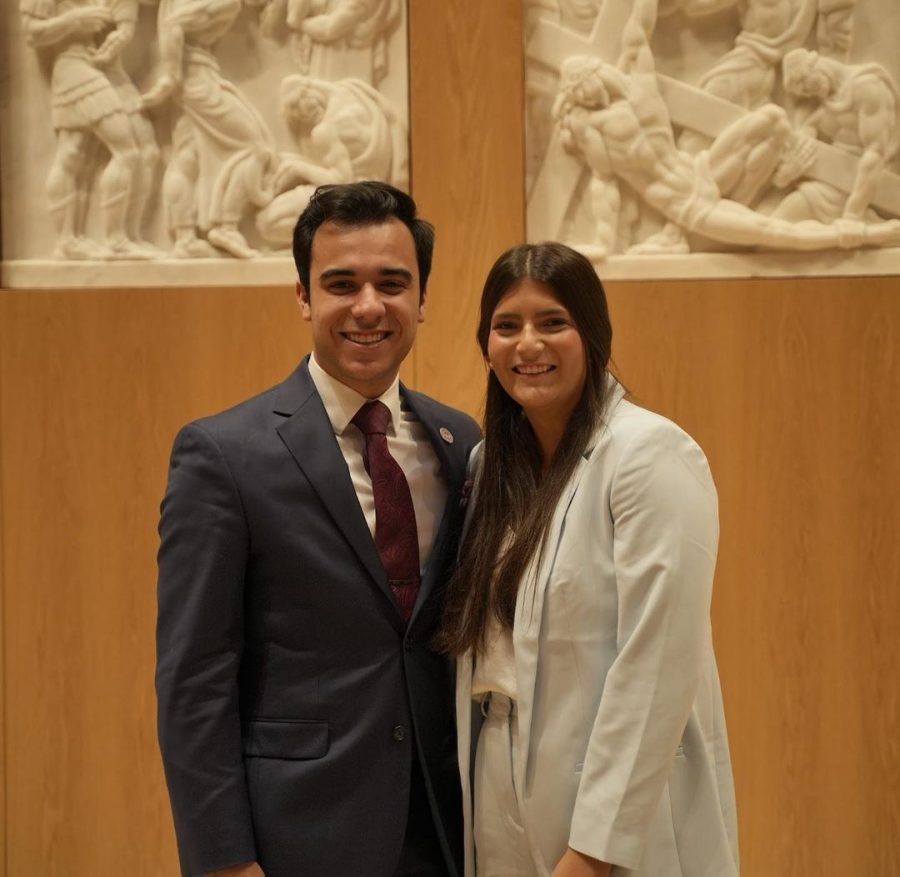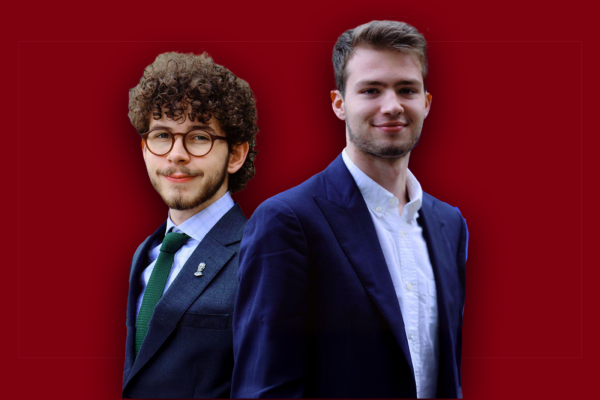Conversation with Winner of USG Executive Ticket
Santiago Vidal Calvo, FCRH ’24, and Ava Coogan, FCRH ’25, were elected as president and vice president of Fordham’s United Student Government (USG) on April 12, 2022. Their win came only a day after The Fordham Ram released details of USG sanctions against members of the organization for unseemly behavior last election cycle. The ticket won on a platform of international inclusivity.
Vidal, an international student from Venezuela, and Coogan, an Armenian-American, boasted what they called the “most diverse ticket in Fordham history,” with the goal of creating a new and improved campus environment. Despite being on the younger end of executive ticket candidates, Vidal and Coogan demonstrated experience and initiative; during his work as a senator, Vidal proposed randomized surveillance COVID-19 testing on campus and pushed for expanded food options, which resulted in the inclusion of poké bowls in Urban Kitchen.
In an interview with the Ram, Coogan spoke on their campaign initiatives, emphasizing outreach as a vital part of their work. “I didn’t realize a lot of students genuinely didn’t know what USG meant or what student government was,” she said, referring to her time spent canvassing for ballot signatures with her running mate.
Coogan also stated that her and Vidal plan on sending an “initiatives tracker” to students at the beginning of the fall 2022 semester, which would illustrate each senator’s projects. At the end of the academic year, an email would be sent out again “so students will know exactly what we accomplished,” said Coogan.
Vidal said he has even grander goals for his first semester as executive president. He said he wishes to hold a state of the union address, where “every senator would give a small speech” and improve overall visibility of student government. Incoming freshmen in particular may be unaware of USG’s existence, and he said the address would be a great way to welcome new and transfer students to the Fordham community.
Vidal and Coogan state that current Executive President Thomas Reuter, FCRH ’22, has been very helpful during the transition, which is ongoing. Vice President Arianna Chen, FCRH ’22, “did not really want to do the transition with us,” said Vidal. “Her refusal to work with Ava was shocking,” said Vidal. “It just demonstrates that students think that the USG does not do tenable change, that this organization is a joke, that meme accounts run the university and not us. It’s just disappointing.”
In an email from Chen and Reuter, they provided a joint statement in response to the accusation that Chen did not aid in the transition: “USG was very excited to host our transition meeting and inauguration this past week, and finish with the 2021-2022 Board. We are proud of the work USG has done this past year and very sincerely hope for the continued success of our organization. The transition process is multifaceted: It includes transferring emails and documents, sharing various resources and facilitating relationships with advisors.”
In an email from Chen on April 29, 2022, she provided another written statement saying: “The Executive Ticket is a two-person show; the transition follows that format and moves from one party to the next, as opposed to one individual to the other. I have been part of all standard protocol transition processes, and there has been no communication made to me of any additional items being requested from the incoming Ticket or Board. If there is anything outside the norm that I can do which would be helpful, those comments can be addressed directly to me and I would be happy to oblige. However, any and all claims that I have not abetted in a transition process, or have been part of ‘stagnant leadership’ after leading one of the most diverse senate classes in recent history as one of the first women of color in this role, are both blatantly false and inherently racialized.”
As of Tuesday night Chen has not commented further on the matter.
As representatives of the classes of 2024 and 2025, Vidal assures that the rising senior class of 2023 will be included under his United Student Government through the president pro tempore position, which he is “pushing” to be filled by a 2023 graduate. He feels the position has a lot of potential, but explains that he “was not paid much attention to” during his run as president pro tempore this past academic year.
With the arrival of President-elect Tania Tetlow, J.D. to campus next fall, the ticket wants to make sure Tetlow has a connection with Fordham students. Because the COVID-19 pandemic interfered with the classes of 2024 and 2025’s ability to know Rev. Joseph M. McShane, S.J., president of the university, the new USG executive leadership intends on encouraging the incoming president to interact with the student population as much as possible according to Vidal.
Vidal and Coogan say they plan on placing a new emphasis on meetings between the university president and USG in the hopes that they will foster a stronger relationship and mutual understanding.
On the topic of their personal feelings post-election, Coogan says she feels honored that upperclassmen “put their trust in me and voted for [her]” and is excited to be elected as vice president. “I’m ready to show those people that voted for me that I can get it done,” said Coogan.
Vidal said the feelings after his new appointment were hard to put into words. “I come from a country where everything you have is a sense of appreciation and the small things matter a lot,” said Vidal. He feels particularly inspired by the university’s Jesuit ideology of “cura personalis” — care for the whole person — which he says is often missing in his home country of Venezuela. “When you lack those things in your life, you understand the value of those things,” he said.
In reflecting on the ticket’s newfound responsibility, Vidal said that “a lot of people voted for us because they saw us as the candidates of change,” which motivates their goals for the next year. Because he believes that many of USG’s problems stem from stagnant leadership, Vidal says that “a lot of fingers were being pointed at us because we were running against the whole structure [of USG].”
However, according to Vidal and Coogan the ticket feels emboldened by the student body’s obvious trust in them to transform USG. Students want “accountability” and “transparency,” said Vidal and following through on these campaign promises is their primary goal.
The two also acknowledged the short election window, which occurred just before the university’s break for Easter. Coogan states they plan on working with the vice president of communications to make changes conducive to a more engaged and reciprocal relationship between USG and students. “Maybe having an email sent out with [the candidates] platforms in the email would be beneficial for the students to have,” the new vice president said.
Both agree that the election process is too “complicated” and “overwhelming” and Vidal would like “to revisit the possibility of in-person voting,” which he thinks would result in higher rates of participation.
In consideration of The Fordham Ram’s investigation into the mishandlings by the previous iteration of the United Student Government, neither Vidal nor Coogan stand for any reprobation against their win of over 300 votes. In their attempts to get on the ballot, Vidal and Coogan reached a thousand student signatures, which is unheard of in previous USG elections. Vidal said the student support for them was clear from the beginning, and he feels that they would have won even if the controversy from last year had not re-emerged.
Currently, it is the policy of USG to not disclose any election sanctions. Vidal and Coogan are already making the moves to revise this, with the belief that it should be up to the election commission to “release sanctions dependent on the situation.” “I think we disagree with the election commission in some senses of the ruling last year,” the new executive president affirmed. “And in some senses the ruling for candidacy this year.”
Coogan says the situation is very complex. “It’s important information to have, but on the other hand you don’t want to be publicly shaming people,” she said. In agreement with Vidal, she said “it would definitely have to be evaluated by circumstance.”
In the election code, if a candidate has committed a major infraction, i.e. “significant material impact on the Election and causes severe harm to the integrity of the election,” they could be fined “25% of the total allotment of spending” or “[suspended] from campaigning for a period of time no less than 12 hours and no more than 24 hours.”
For a major infraction, Vidal feels these sanctions are a “slap on the wrist.” Coogan agrees, saying that there is a “lack of overlap with the school’s own conduct and harassment policy.”
“You can get fined up to 50% of your budget if you go one cent over,” said Vidal. He draws a comparison to the sanctions of last year against certain USG members and how they were still permitted to run for election. He calls the sanction protocol a “difference in priorities.”
Finally, Vidal asks for trust. He says the Vidal-Coogan ticket is all about inciting change, which he insists is only possible through “moving on.”
In closing, Coogan asks that people “have faith in us,” with which Vidal concurs.
“A lot of people’s big concern with us was that we are a younger ticket, but I know that we can make change,” said Coogan.
Update: On April 29, 2022 a second statement from Executive Vice President Arianna Chen was added to the article.

Samantha “Sam” Minear is a senior from Long Branch, N. J., majoring in international studies and communications. She started as a contributing writer...









































































































































































































